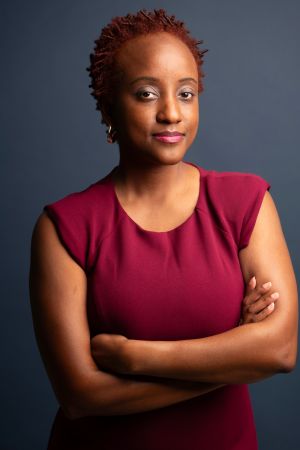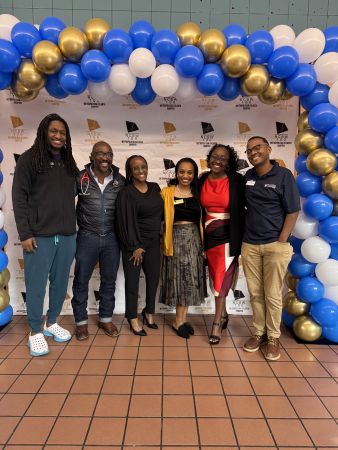Black Women and HIV Support: Strength In Community
‘HIV Saved My Life’ — Kennedi Lowman Shares Her Powerful Story On World AIDS Day [Exclusive]
From a devastating diagnosis to a life of advocacy, Kennedi Lowman's story reveals the power of resilience.
Share the post
Share this link via
Or copy link

Kennedi Lowman was 29 and thriving in her career as a medical lab scientist at a hospital in Atlanta when her life took an unexpected turn. The call came after she donated blood—a voicemail from the American Red Cross urging her to return the message right away.
“In my mind, I’m like, what is wrong with me?” she remembered. As someone who worked in healthcare, she knew exactly what that kind of urgency meant. What she didn’t expect was that the call would reveal she was HIV-positive.
Looking back, there had been signs, though easy to miss. “I had a respiratory and sinus infection, plus a norovirus infection,” Kennedi recalled. “HIV symptoms can mimic the flu, which is why it’s so important to get tested if you’re sexually active.” After piecing together her medical history, she believes she likely contracted HIV sometime in 2015.
Love MadameNoire? Get more! Join the MadameNoire Newsletter
We care about your data. See our privacy policy.
Still, Kennedi doesn’t view that diagnosis as the end of her story; she sees it as the beginning. “HIV saved my life,” she says now, without hesitation.
RELATED CONTENT: HIV Myth-Busters: Debunking The Biggest Misconceptions In Black Communities
From Diagnosis to Destiny
In the beginning, the fear and stigma consumed her. “I thought no one would want to date me, that I couldn’t have kids, that I was damaged,” she shared. That internalized shame led her into a two-year depression, during which she kept her diagnosis to herself, telling only her sisters. It wasn’t until she made the conscious decision to take control of her story—and her health—that her purpose began to unfold.
What started as a deeply personal struggle turned into a powerful platform for service and sisterhood. On December 1, 2018—World AIDS Day—Kennedi went public with her story. “I didn’t see other young Black women in Atlanta living with HIV talking about it,” she said. “So I became that person.”
Out of her pain came purpose. Kennedi co-founded LOTUS—Loving Ourselves Through Unity and Strength—an Atlanta-based national support network for cisgender women living with HIV. The organization was born out of a glaring gap: “It’s like the world looks at everyone else living with HIV except for cisgender women,” she explained. LOTUS provides emotional support, education, and empowerment to women who are often left out of the HIV conversation.
Through LOTUS, Kennedi has cultivated a space where women feel seen, heard and uplifted. Whether it’s a two-hour support group meeting for a sister who just needs to cry, or texting a college student newly diagnosed with HIV to check on her semester, Kennedi shows up. “Support is everything,” she emphasized. “It can change someone’s life.”
Thriving as a Long-Term Survivor
In honor of the upcoming National HIV Testing Day (June 27), Kennedi is reflecting not just on how far she’s come, but on the power of survival itself.
“Back in the ’80s, people were given two weeks to get their affairs in order,” she said. “So if you made it to week three, you were a survivor.” For Kennedi, being eight years into her journey means something monumental. “When I meet women who’ve been living with HIV for 15 or 20 years, I think—yes, I’m going to make it, too.”
Her work doesn’t stop at LOTUS. Kennedi is also a member of the HIV Health Equity Task Force at the Morehouse School of Medicine’s Satcher Health Leadership Institute, lending her voice to national conversations on treatment access, stigma, and care equity.

Her Message to Black Women
One of the most damaging myths Kennedi Lowman is determined to dismantle is the idea that women living with HIV don’t—or shouldn’t—have sex. “There are plenty of serodiscordant relationships,” she explains, referring to partnerships where one person is HIV-positive and the other is not. “I’m not putting myself in a box. I know what I like, and I’m going to speak up about it.”
For Kennedi, living with HIV became a catalyst for deeper self-awareness. It taught her how to advocate for her own pleasure, to set boundaries, and to speak unapologetically about her needs. “If you’re not walking away from sex feeling good—feeling seen and satisfied—then maybe that experience wasn’t for you. Or maybe it’s time to speak up and ask for what you need.”
Her passion for empowerment runs deep, especially when it comes to Black women navigating their own health journeys. Kennedi’s advocacy is rooted in real, lived experiences—like the woman she met at her very first community HIV event who couldn’t even bring herself to say the word “HIV.” That same woman went on to earn her GED, buy a home, and eventually teach healthy relationship workshops for others living with HIV. “She built herself up,” Kennedi recalls with pride. “And I had the honor of witnessing that transformation.”
To women who are newly diagnosed, her advice is clear and compassionate: “Find your people. Get support. You don’t have to carry this alone.” And for women who are HIV-negative? The message is just as powerful: “Use your voice. Stand firm in your truth. Get tested. And never forget—you deserve both pleasure and protection.”
Kennedi also reminds everyone, regardless of status, to take charge of their health. “If you can’t be honest with your provider about what’s really going on, then that’s not the provider for you. Find one who respects your truth.”
Today, Kennedi isn’t just surviving—she’s thriving. Not in spite of her diagnosis, but because of it. “HIV made me stronger. It helped me find my voice,” she says. And now, she uses that voice to help others find theirs. “Life is for the living,” she says with conviction. “And I’m gonna live it.”
Ashley Cobb is a sexual wellness expert and writer. This piece was created in honor of National HIV Testing Day.
Observed annually on June 27, National HIV Testing Day serves as a reminder of the importance of knowing your HIV status. Early detection saves lives, helps prevent the spread of disease, and connects people to the care they deserve. This year’s theme is “Level Up Your Self-Love: Check Your Status”—because taking care of yourself starts with your health.
Find free, confidential testing near you at gettested.cdc.gov.
RELATED CONTENT: Living with HIV: One Woman’s Story of The Power of Community Support
Related Tags
AIDS aids awareness black women STDs HIV HIV stigma HIV/AIDS Kennedi Lowman sex and intimacy STD STDs-

Meet Dominique Fils-Aimé, The Haitian-Canadian Star Redefining Jazz For A New Generation: ‘This is My Vision' [Exclusive]
-

Cooking With Purpose — How Brittney Williams Honors Her Caribbean Roots Through Food
-

Bucket Baddies With Big Energy — The 30 Hottest NBA Players In The Game Right Now
-

8 Famous Lesbian Women Who Were Married To Men



